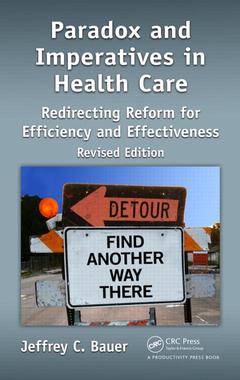Paradox and Imperatives in Health Care (2nd Ed.) Redirecting Reform for Efficiency and Effectiveness, Revised Edition
Auteur : Bauer Jeffrey C.

The Paradox: Americans are not as healthy as people in dozens of comparable countries that spend 30 percent less on health care, and our medical marketplace overall is plagued by persistent problems of cost, quality, and access. Yet, the world?s best individual health systems are located in the U.S.?each a unique result of visionary leadership and private initiative, not government-driven health reform.
The Imperatives: Due to powerful new forces explained in this book, medical spending has stopped growing. Purchasers, payers, and patients are no longer willing or able to keep paying more. To stay in business and improve population health, providers and their business partners must eliminate the shameful waste generated by inefficient and ineffective production processes.
The Solution: Simply repairing or repealing the Affordable Care Act will not get us where we want to go. The fundamental roadblock is a wasteful system, not uninsured Americans. Reform needs to be immediately redirected to creating the best health care system that 17 percent of GDP can buy. Money saved by taking the new path to reform can then be used to improve population health through access for all. Paradox and Imperatives in Health Care is the roadmap for getting there.
- Supplies updated perspectives on health care?s problems and solutions
- Details the reasons why government-driven reform does not solve problems
- Provides a justification for regulatory relief tied to performance improvement
- Suggests specific new policies for a better approach to desired outcomes
- Presents content written expressly for busy executives and policy makers
Introduction: The Paradox. The Economic Challenge: Chaos. The Economic Imperative: Efficiency (Cost). The Clinical Imperative: Effectiveness (Quality). Tools for Efficiency and Effectiveness. Redirecting Reform: Strategic Recommendations. Epilogue: Organizational Success Factors for Efficiency and Effectiveness.
Dr. Jeffrey C. Bauer is an internationally recognized health futurist and medical economist. As an independent industry thought leader, he forecasts the evolution of health care and develops practical approaches to improving the medical sector of the American economy. He is widely known for his specific proposals to create an efficient and effective health care delivery system through multistakeholder partnerships and other initiatives focused in the private sector.
Dr. Bauer has published more than 250 articles, books, web pages, and videos on health care delivery over the past 45 years. He speaks frequently to national and international audiences about key trends in health care, medical science, technology, information systems, reimbursement, public policy, health reform, and creative problem solving. Dr. Bauer is quoted often in the national press and writes regularly for professional journals that cover the business of health care. His latest book is Upgrading Leadership’s Crystal Ball: Five Reasons Why Forecasting Must Replace Predicting and How to Make the Strategic Change in Business and Public Policy (Taylor & Francis, Boca Raton, FL, 2014). Other recent books include Paradox and Imperatives in Health Care: How Efficiency, Effectiveness, and E-Transformation Can Conquer Waste and Optimize Quality (with Mark Hagland; Productivity Press, New York, 2008) and Statistical Analysis for Health Care Decision-Makers (CRC Press, Boca Raton, FL, 2009). His two previous books are Telemedicine and the Reinvention of Health Care: The Seventh Revolution in Medicine (with Marc Ringel; McGraw-Hill, New York, 1999) and Not What the Doctor Ordered (McGraw-Hill, New York, 1998).As a consultant, he has assisted hundreds of provider, purchaser, and payer organizations with strategic planning and performance improvement. He served as industry thought leader for the Superior Consultant Company and (after acquisition) as vi
Date de parution : 10-2014
15.6x23.4 cm
Thèmes de Paradox and Imperatives in Health Care :
Mots-clés :
Health Care; Medical Marketplace; The Political Paradox; Today’s Medical Marketplace; The Economic Imperative (Cost); Certified Nurse Midwives; The Clinical Imperative (Quality); Health Care Delivery; Organizational Transformation for Efficiency and Effectiveness; Follow; Blueprint for Good Health Care in the United States; Clinical Pharmacists; Performance Improvement Tools; Pi Program; U-shaped Cost Curves; Delivery System; Health Care Delivery System; Medical Spending; Health Reform; American Health Care; Affordable Care Act; ACA; Face To Face; Health Care Today; Health Care Providers; Provider Organizations; Holds; Payment; United States; Pay For Performance


